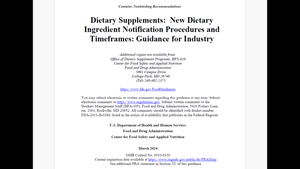Durbin introduces supplement bill
Senators Dick Durbin (D-IL) and Richard Blumenthal (D-CT) officially introduced the Dietary Supplement Labeling Act (S. 1310) yesterday, primarily targeting products that blur the line between dietary supplement and food/beverage.
July 1, 2011
.png?width=850&auto=webp&quality=95&format=jpg&disable=upscale)
Among the key provisions of the legislation, as proposed, FDA would have to clearly define what makes a product a food or beverage versus a dietary supplement, for regulation purposes, and dietary supplement companies would have to register their products and other info with FDA. The supplement industry has criticized the bill as redundant, saying the products that drove the creation of the billnamely melatonin-containing baked goodsare already covered in existing regulations.
Durbin complained last month how because baked good such as Lazy Cakes, Kush Cakes, and Lulla Pies are marketed as dietary supplements, their melatonin content is not considered food additives requiring FDA approval. He said under current law, it is the choice of the manufacturer as to whether a product is classified as a food or as a dietary supplement.
Last month, Durbin raised concerns with the Food and Drug Administration (FDA) about baked goods such as containing melatonin that, because they are marketed as dietary supplements, do not require approval by the FDA for use as additives in food. In January 2010, the FDA issued a warning letter to the manufacturer of Drank for selling a beverage containing melatonin. The manufacturer responded by changing the labeling of Drank from a beverage to a dietary supplement which do not require approval by the FDA for use as additives in food.
Walk down the aisle of your local convenience store and you will see products targeting young people with names like Lazy Cakes, Drank and Monster Energy Drink, said Durbin. These products market themselves as dietary supplements that are safe ways to relax or get a boost of energy, when in reality they are foods and beverages taking advantage of the more relaxed safety standards for dietary supplements. My bill would help curb this unsafe practice.
For his part, Blumenthal noted consumers deserve to know what adverse effects these products can have on their health and wellbeing. Truth in labeling and honest marketing is critical to consumer safety- especially in products targeted towards young people - and should be required as an industry standard, he said.
While the proposed legislation would affect all dietary supplement companies, Durbin was quick to streamline his focus away from common vitamin products, adding he takes vitamins just as millions of Americans do. My gripe is not with the array of vitamins available at health stores across the nation; my gripe is with products labeled as dietary supplements whose ingredients have not been deemed safe by the FDA but are found on store shelves right next to conventional food and beverages, he offered. The current system favors the manufacturers of these products to the detriment of consumers, and that needs to change.
Still, the industry sees this bill as another attempt by Durbin to strangle the dietary supplement industry and chip away at DSHEA (the Dietary Supplement Health and Education Act of 1994).
Steve Mister, president and CEO of the Council for Responsible Nutrition (CRN), summed up the opposition to the bill by calling it a misguided bill that doesnt address the concerns raised by Senator Durbin, but instead creates more bureaucracy for an already resource-challenged agency and more red tape and costs for industry while doing nothing to further protect consumers from his concerns. Mister further pointed out, "Instead of urging FDA to use its current enforcement authority to isolate and punish those companies that are not following the law, this bill serves to punish all responsible companies with its overreaching mandates."
Michael McGuffin, president of the American Herbal Products Association (AHPA), the bill proposes legislative solutions, when regulatory enforcement is what is really needed. He noted in addition to requiring supplement companies to register with FDA and directing FDA to officially delineate conventional foods from dietary supplements, the bill would mandate supplement labels include batch numbers as well as information on known risks of ingredients, including a mandatory warning for any ingredient that may cause potentially serious adverse events. He explained some of these requirements are already addressed by existing regulations or protocol.
"Supplements may not be represented as conventional foods and must be labeled to include all informationincluding safety informationthat is material in light of the consequences that may result from their use. And while no one will argue with the wisdom of using product lot numbers, it is already the standard industry practice to do so, McGuffin said. He further noted the bills attempt to force dietary supplement registration is an issue Durbin has pushed in the past.
What the bill mandates
According to the Congressional Record, the bill would amend the Federal Food, Drug and Cosmetic Act (FFDCA) to specifically require dietary supplement manufacturers to register their facility as well as the following information:
A description of each dietary supplement product manufactured by such facility;
A list of all ingredients in each such dietary supplement product; and
A copy of the label and labeling for each such product.
In addition, the bill would require updated registration when the company begins making a product it hasnt made nor registered previously, when a registered product is reformulated, or when it discontinues making a registered product.
The bill stipulates such registrations and updates be made within 30 days of beginning manufacturing, reformulating or discontinuing an applicable product.
In addition to all these amendments to FFDCA, Durbins bill would direct FDA to compile a list of dietary supplement ingredients and proprietary blends of ingredients that could cause potentially serious adverse events, drug interactions, contraindications, or potential risks to subgroups such as children and pregnant or breastfeeding women. FDA would then engage the Institute of Medicine (IOM) to evaluate supplement ingredients and proprietary blendsincluding those on FDAs compiled listand any relevant scientific literature; within 18 months, IOM would then be required to deliver a report on the safety of supplement ingredients and blends IOM determines determines could cause potentially serious adverse events, drug interactions, contraindications, or potential risks to subgroups such as children and pregnant or breastfeeding women.
Within two years of the delivery of the IOM report, and after a public comment period, FDA would be mandated to identify ingredients and blends it considers potentially dangerous and establish mandatory warning label requirements for these flagged ingredients and blends relative to the IOM report.
Further, within one year of the passage of the bill, FDA would be required to officially define conventional foods, taking into consideration products labeled as dietary supplements but simulating conventional foods in appearance and merchandising.
All of these requirements place more burden on FDA. Mister arggued piling more work on an underfunded agency already struggling to accomplish everything currently on its plate is both counterproductive and unnecessary. "FDA needs to continue working toward becoming a more efficient steward of its resources, and we continuously call on the agency to use its power under the law," he said. "We urge Senator Durbin to join us in that effort."
You May Also Like




.png?width=800&auto=webp&quality=80&disable=upscale)